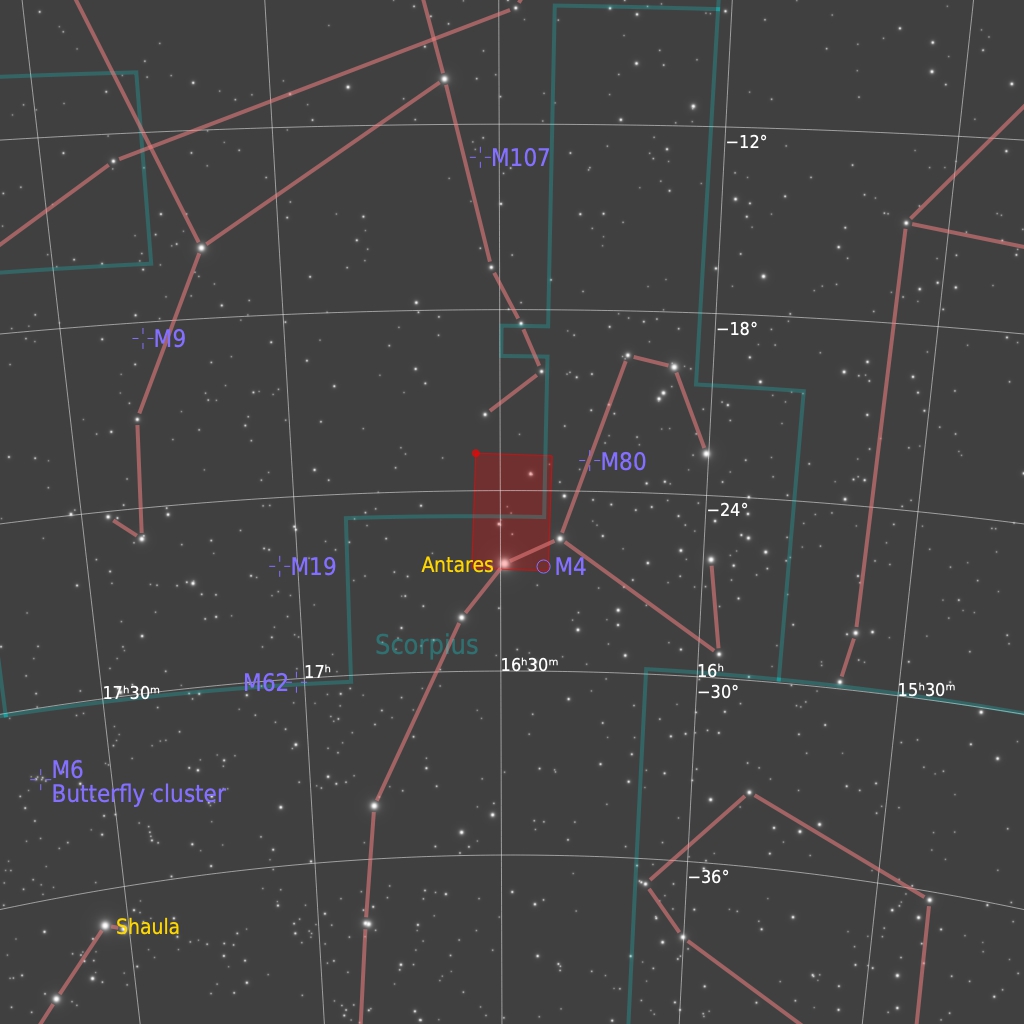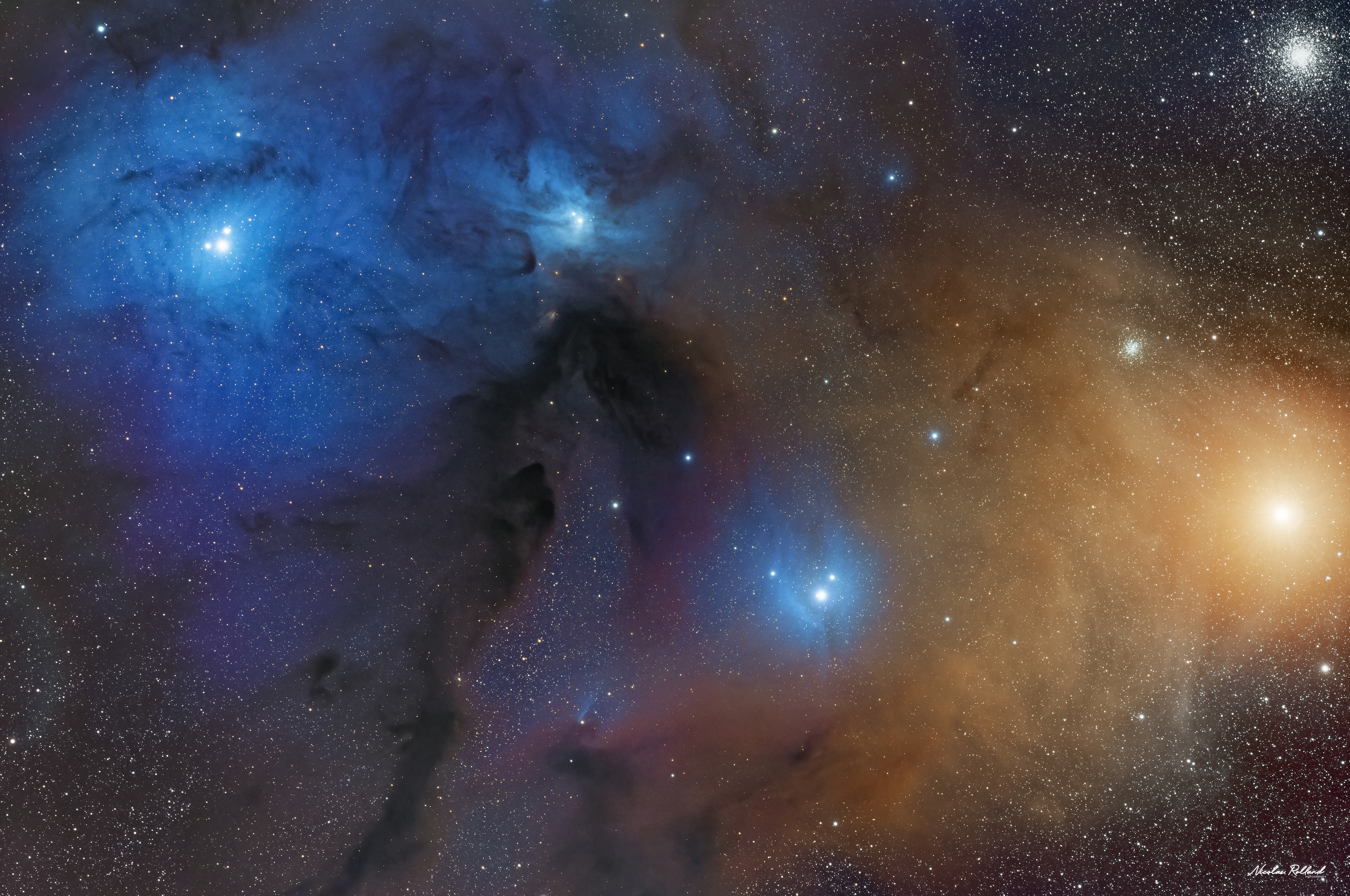Rho Ophiuchi Cloud Complex
IC 4604
IC 4604 (Rho Ophiuchi Nebula) is a large diffuse nebula of 5th magnitude located in the southwestern corner of the constellation Ophiuchus, surrounding the bright multiple star system Rho Ophiuchi. Several regions of bright and dark nebulosity surround this area, which takes its name from ρ Oph.
Highlighted by the bright star Antares, the region provides an impressive spectacle of colorful glowing gases, juxtaposed with converging dark rivers of thick dust. Other areas of nebulosity within the region include IC 4603, centered around the star SAO 184376; and IC 4605, around 22 Scorpii. The nebulosity around Antares itself (α Sco) is designated IC 4606. Dark nebulae Barnard 45 and Barnard 42 separate the reflection nebulosity near ρ Oph (IC 4603 and IC 4604) from the nebulosity closer to 22 Sco and Antares (IC 4605 and IC 4606).
At a distance of some 540 light years, IC 4604 is one of the nearest star-forming regions to the Sun. The colorful clouds surrounding Rho Ophiuchi represent the visible counterpart of a much larger but invisible molecular cloud permeating the region. This Ophiuchus cloud lies well above the plane of the galaxy, near the border of the Scorpius-Centaurus OB association. About 1.5 million years ago, a massive star in upper Scorpius exploded as a supernova, sending a powerful shock wave through the Ophiuchus clouds about 1 million years ago, triggering star formation that is still continuing today.
This image was a test of the new QHY600M camera using only 45 min of exposure for each RGB filter using a Takahashi FSQ106 EDX3.
IC 4604 (Nébuleuse Rho Ophiuchi) est une grande nébuleuse diffuse de magnitude 5 située dans le coin sud-ouest de la constellation de l’Ophiuchus, entourant le système d’étoiles multiples Rho Ophiuchi. Plusieurs régions de nébulosité brillante et sombre entourent cette zone, qui tire son nom de ρ Oph.
Mise en évidence par l’étoile Antarès, la région offre un spectacle impressionnant de gaz lumineux et colorés, juxtaposés à des zones sombres de poussière épaisse. D’autres zones de nébulosité dans la région correspondent à IC 4603, centrée autour de l’étoile SAO 184376, et IC 4605, autour de 22 Scorpii. La nébulosité autour d’Antarès elle-même (α Sco) est désignée : IC 4606. Les nébuleuses sombres Barnard 45 et Barnard 42 séparent la nébuleuse en réflexion près de ρ Oph (IC 4603 et IC 4604) de la nébulosité plus proche de 22 Sco et Antarès (IC 4605 et IC 4606).
À une distance d’environ 540 années-lumière, IC 4604 est l’une des régions de formation d’étoiles les plus proches du Soleil. Les nuages colorés qui entourent Rho Ophiuchi représentent un nuage moléculaire beaucoup plus grand, mais invisible qui imprègne la région. Ce nuage d’Ophiuchus se trouve bien au-dessus du plan galactique, près de la frontière de l’association OB Scorpius-Centaurus. Il y a environ 1,5 million d’années, une étoile massive située dans la partie supérieure du Scorpion a explosé en supernova, envoyant une puissante onde de choc à travers le nuage d’Ophiuchus, déclenchant ainsi la formation d’étoiles qui se poursuit encore aujourd’hui.
Cette image résulte d’un test de la caméra CMOS QHY600M, utilisant seulement 45 minutes d’exposition pour chaque filtre RGB et montée sur une lunette Takahashi FSQ106 EDX3.
TECHNICAL DATA
ACQUISITION DETAILS
OPTICS Takahashi FSQ106 EDX3 @ F/5
CAMERA QHY600M
MOUNT Paramount ME
FILTERS R, G, B
LOCATION Heaven's Mirror Observatory, Yass, Australia
DATE July 2020
EXPOSURES 2.25 hours (R 3 x 900 sec, G 3 x 900 sec, B 3 x 900 sec)
PROCESSING SOFTWARE Pixinsight, CCDstack, Photoshop
COPYRIGHTS Martin Pugh & Nicolas Rolland

TARGET DETAILS
RA 16h 28m 17.4s
DEC -24° 42' 50.8"
SIZE 3.84 x 2.55 deg
ORIENTATION Up is 92.1 degrees E of N
CONSTELLATION Ophiuchus
DISTANCE 390 ly
